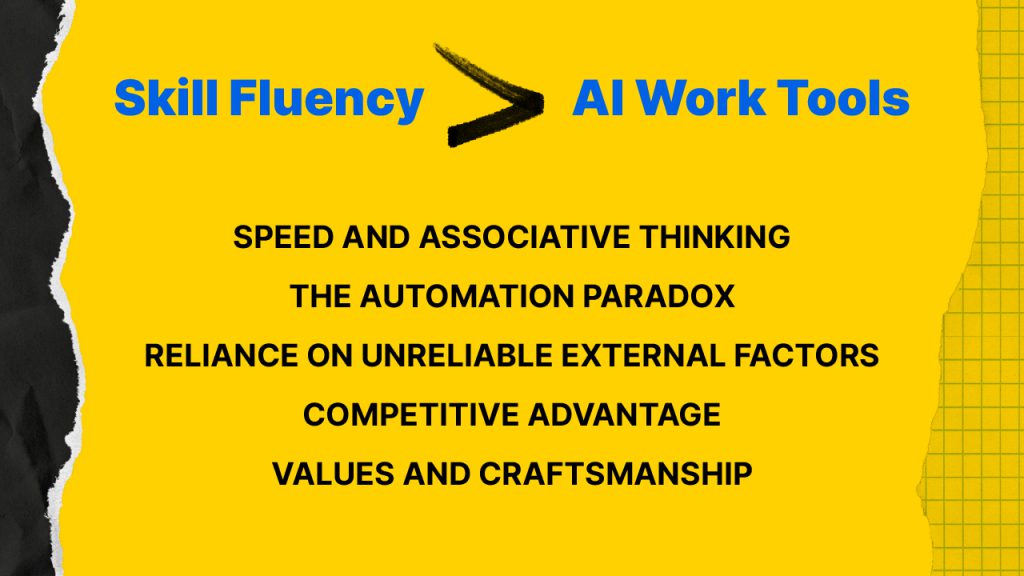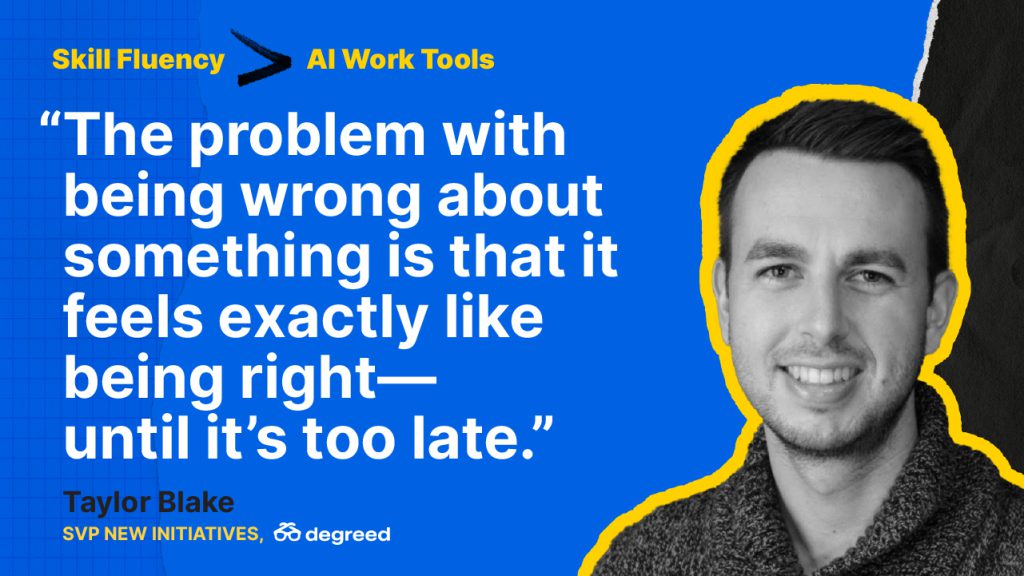If you visit Mexico for a week, a translation app will get you by (for non-Spanish speakers like me). But what if you move to Mexico? You’ll probably want to aim for fluency, and not have to rely on an app all the time.
Like a translation app on vacation, AI tools are always ready to help you at work. They can answer questions, give suggestions, and even do some of your work for you.
With the ability to get help at work “just in time,” you might think you won’t need to learn important tasks ahead of time. Or that it may not be worth the effort to learn tasks “just in case” they’ll might pop up during the workday.
It’s true that AI capabilities will transform how you get work done. Still, I believe that, amid all this change, a simple and time-tested fact of work life will persist: Employees need to draw on skills and expertise without the help of technology. I call this skill fluency.
AI assistants are getting smarter.
OpenAI, Microsoft, and Apple have announced that AI assistants will soon be able to understand context. In other words, they’ll be able to “see” what we’re doing on our digital devices and across applications. As such, we’ll be able to ask them to assist us in the digital work we do.
If you haven’t already seen it, check out the video demo below from OpenAI. This video demonstrates the types of interactions you can have with GPT-4o when it can see your screen.
And check out this video from Google to see how AI can assist us in navigating physical spaces using our cameras.
AI is the Translation App, Your Skills are Language Fluency
AI demos (like the videos shared above) can leave us reeling and rethinking what skills we should spend time developing. Similarly, when OpenAI recently demoed its live translation capabilities in May, the stock price for Duolingo, a free language learning app, fell 3.5%. The market was wrestling with the question, “Do people still need to learn a language if they can use real-time language translation everywhere they go?”
The stock price has since recovered, perhaps based on the understanding that while translation is undoubtedly useful, it will never replace actual language fluency. You need fluency—and not just after a move to Mexico.
You need fluency for everyday life, wherever you might be. You speak about 16,000 words per day. You can’t outsource your most critical and fundamental form of communication. In interactions and relationships where speed, collaboration, and intimacy matter, you need fluency.
Skill Fluency in the Workplace
You also need skill fluency at work. Ask yourself this, “Is my work like an everyday interaction or more of a short vacation?”
Certainly, practical use cases exist for each approach. For tasks you perform infrequently (the short vacations), your ability to look up information is critical. I never seem to remember how to write a vlookup formula in Excel. Whenever I do need it I do a search, and AI makes that process seamless.
But for the core parts of my work (the everyday interactions), there are tools and processes I rely on seemingly all the time. I don’t want any friction using these tools. I want skill fluency.
This analogy of fluency (everyday use) vs. translation (infrequent use) addresses a key dynamic of AI use. But it’s not the only dynamic at play. AI can help you with new or rare tasks, and it can even take on repetitive, mundane everyday tasks. It can also help you start, overcome obstacles, or gain new perspectives.
And through it all, one thing will remain true. No matter how AI assists you, your own abilities will remain the critical component at the core of the process. The bigger and stronger your core, the better the interplay between you and AI becomes, and the better off you’ll be.
5 Reasons to Develop Skill Fluency in Your Core Areas of Expertise

1. Speed and Associative Thinking
Internalized knowledge helps you think fast, connect ideas easily, and see patterns without always having to search for information. To highlight the importance of speed in our work, computer scientists use a flute analogy. Imagine trying to play the flute with a one-second delay between blowing a note and hearing it. The delay would make it difficult for you to practice or perform, right?
Your thinking and problem-solving skills work best when you can access your knowledge without any distractions. Studies on working memory reveal that expertise involves complex cognitive chunks that boost reasoning skills. These chunks, like mental building blocks, enhance your capacity to unlock deeper understanding and creativity.
2. The Automation Paradox
The paradox of automation is this: When you use machines to replace work, those machines also need to be installed, maintained, and managed, which leads to additional types of work. Replacing routine work increases your dependence on the expertise needed to maintain a complicated system and manage exceptions.
We’ve seen this trend with airplanes. Have you ever looked into an airplane cockpit recently? They’re complicated systems.
As Captain Chelsey Sullenberg (who heroically landed the plane on the Hudson River) has said, “It requires much more training and experience, not less, to fly highly automated planes.” When it comes to AI, every individual needs to maintain the expertise needed to oversee and manage AI systems.
3. The Unreliable GPS
I use GPS to navigate my path almost anywhere I go. This means my ability to get anywhere unassisted, especially when I’m crisscrossing a new city or country, is really bad. Like “I refuse to pull out of the grocery store parking lot until my GPS is ready” bad.
Research shows that London cab drivers, who must legally memorize the city’s complex and twisty street map, boast larger brain hippocampi than the rest of us. But most of us don’t drive cars for a living, so relying on GPS is a rational trade-off between convenience and navigational dexterity.
The real challenge comes from the fact that AI is an unreliable GPS. What if 10% of the time the GPS guided you to random coordinates? Even worse, what if you had no way of knowing you were off course until it was too late?
The problem with being wrong about something is that it feels exactly the same as being right—until it’s too late. Outsourcing expertise to AI is an unpredictable trade-off because it is difficult to anticipate the manifestation and cost of errors.

4. The Last Real Competitive Advantage
When AI tools are in everyone’s hands, you’ll need something non-AI to set you apart from everyone else. We’re used to relying on traditional “moats” such as prior experience or a college degree that helped us maintain our positions in the workplace.
Now, AI is a great equalizer. If you rely on AI for most of your work, then you’re easily replaceable by anyone else who has access to the same AI tools. This means that being able to constantly learn has become the new way to set yourself apart and maintain your personal competitive advantage.
5. Values and Craftsmanship
Not everything should be about short-term economics. I feel great joy and satisfaction from learning and being good (for brief moments at least) at what I do. As technology eats into more of our everyday lives, we may be headed for a crisis of meaning (if it wasn’t here already).
Designing work that amplifies joy and meaning may not bring a short-term ROI boost, but I do think it will matter in the long run. AI is making it easier than ever to create mediocre work and products. But I suspect people will gravitate towards companies that value craftsmanship.
Don’t stop investing in expertise.
We can expect that new AI capabilities will continue to shape L&D trends and advance on-demand performance support. No doubt there will be huge productivity gains from these technologies.
However, we cannot write off the need for skill fluency and the processes that develop it. We cannot let our organizations and leaders discount the need to continue to invest in underlying skills and capabilities. Never assume that inexperienced employees using AI are equally as capable as your internal experts.
I believe the future will dramatically reward people and companies that continue to develop expertise and not merely rely on AI shortcuts. If something really matters, aim for skill fluency.
(And maybe don’t end that daily usage streak on Duolingo just yet.)

